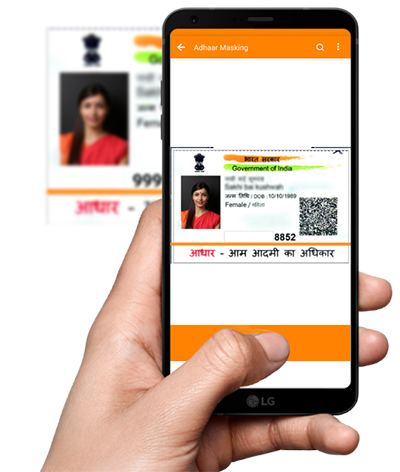Aadhaar masking: A step towards secure Digital Identification system
In India, the Aadhaar card has emerged as a predominant form of personal identification widely adopted by businesses in the BFSI sector. While its utility is undeniable, concerns regarding privacy and security have escalated due to instances of identity theft and data breaches involving Aadhaar information.
While the Aadhaar card has become an extremely important tool for identification, it poses a huge privacy threat if mishandled. The widespread usage of Aadhaar has led to an increase in identity theft frauds or data leakages of personal information on the Aadhaar. In recent years, there has been an upsurge in Aadhaar identity theft cases and misuse of personal information available on the Aadhaar card.
In a recent case where a woman in Chandigarh lost Rs. 80 lakhs in an Aadhaar sim link scam. Scammers posed as crime branch officers to deceive the woman. In this case, fraudsters used the linkage between Aadhaar card and sim. This case highlights how fraudsters are coming up with new tricks to deceive individuals.
These frauds have raised a lot of questions, how safe is our personal information?

The Indian government has issued guidelines on Aadhaar masking/redaction to safeguard the personal information and prevent any identity theft of any individual. Businesses collecting Aadhaar card information need to mask the Aadhaar card which they collect to complete the Digital Customer onboarding/KYC process.
Compliance with regulations, such as the RBI's mandate to share masked Aadhaar for identification verification, is crucial. This not only aligns with legal requirements but also safeguards customer interests by protecting their privacy. Aadhaar masking serves as a pivotal safeguard against the misuse of sensitive information, mitigating risks associated with data and identity theft.
Aadhaar masking is the process of concealing the unique identification number available on the Aadhaar card typically in the form of digital format and documents. This process typically covers the first eight digits of the unique identification number. This practice denies access of the entire unique identification number which further protects the interest of the individuals. The Aadhaar card contains a lot of biometric information about an individual which needs to be protected.
Benefits of Aadhaar masking: The benefits of Aadhaar masking are manifold.
Reduced risk of identification theft
Data security
Safely facilitating sharing of data
User’s control over their information
Importance of Aadhaar masking:
- Adherence to legal compliance: RBI’s guidelines state that it is mandatory to share masked Aadhaar for identification verification purposes. It aligns directly with the guidelines stated by the authorities which protect the interest of customers.
- Privacy protection: The primary purpose of Aadhaar masking is to protect the sensitive information of individual’s Aadhaar. Given the nature of this information is quite sensitive which by masking can protect from data or identification theft.
Aadhaar masking with NetraScan:
NetraScan represents a pioneering AI-based Digital Customer Onboarding/KYC platform that leverages offline OCR capabilities to seamlessly convert text from images or documents into editable formats. Its sophisticated software integrates biometric authentication, ensuring a streamlined process for Digital Customer Onboarding/KYC. This platform excels in digitizing both structured and unstructured documents directly from mobile phone cameras.
NetraScan's document scanner application boasts advanced capabilities for masking sensitive information found on Aadhaar cards. It supports a diverse array of file formats including JPG, PDF, and PNG, ensuring comprehensive coverage for Aadhaar masking requirements. The application's real-time offline Aadhaar masking feature enables instantaneous masking with a single click, significantly enhancing efficiency in customer validation and authentication during the onboarding/KYC process.
NetraScan has streamlined the digitization process by converting images and documents into PDF and JPEG formats. The application excels in optimizing and compressing scanned images and files by up to 90% while preserving original quality. This capability not only facilitates efficient storage but also contributes to significant reductions in associated storage and operational costs.

Conclusion:
In conclusion, Aadhaar masking is an essential practice that addresses critical privacy and security concerns amid increasing reliance on Aadhaar for identification purposes. By implementing Aadhaar masking protocols, businesses uphold customer trust and confidence during digital transactions, underscoring their commitment to privacy protection and regulatory compliance.